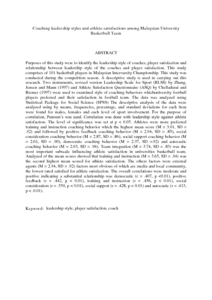Citation
Nazarudin, Mohamad Nizam and Omar Fauzee, Mohd Sofian and Jamalis, Marjohan and Soh, Kim Geok and Din, Anuar
(2009)
Coaching leadership styles and athlete satisfactions among
Malaysian University Basketball Team.
Research Journal of International Studies, 9 (1).
pp. 4-11.
ISSN 1453-212X
Abstract
Purposes of this study were to identify the leadership style of coaches, player satisfaction and relationship between leadership style of the coaches and player satisfaction. This study comprises of 101 basketball players in Malaysian Intervarsity Championship. This study
was conducted during the competition season. A descriptive study is used in carrying out this research. Two instruments, revised version Leadership Scale for Sport (RLSS) by Zhang, Jensen and Mann (1997) and Athlete Satisfaction Questionnaire (ASQ) by Chelladurai and Riemer (1997) were used to examined style of coaching behaviors whichuniversity football players preferred and their satisfaction in football team. The data was analyzed using Statistical Package for Social Science (SPSS) The descriptive analysis of the data were analyzed using by means, frequencies, percentage, and standard deviations
for each item were found for males, females and each level of sport involvement. For the purpose of correlation, Pearson’s was used. Correlation was done with leadership style against athlete satisfaction. The level of significance was set at p < 0.05. Athletes were
more preferred training and instruction coaching behavior which the highest mean score (M = 3.01, SD = .82) and followed by positive feedback coaching behavior (M = 2.94, SD = .85), social consideration coaching behavior (M = 2.87, SD = .86), social support coaching behavior (M = 2.61, SD = .90), democratic coaching behavior (M = 2.37, SD =.92) and autocratic coaching behavior (M = 2.03, SD = .96). Team integration (M = 3.74, SD = .83) was the most important subscale influencing athlete satisfaction in universities basketball team. Analyzed of the mean scores showed that training and instruction (M = 3.65, SD =
.84) was the second highest mean scored for athlete satisfaction. The others factors were external agents (M = 2.84, SD = .92) factors most obvious of which are media and local community, the lowest rated satisfied for athlete satisfaction. The overall correlations were moderate and positive indicating a substantial relationship was democratic (r = .407, p <0.01), positive feedback (r = .442, p < 0.01), training and instruction (r = .456, p < 0.01), social consideration (r = .550, p < 0.01), social support (r = .428, p < 0.01) and autocratic (r = .413, p < .0.01).
Download File
![[img]](http://psasir.upm.edu.my/7452/1.hassmallThumbnailVersion/Coaching%20leadership%20styles%20and%20athlete%20satisfactions%20among%20Malaysian%20University%20Basketball%20Team.pdf)  Preview |
|
PDF (Abstract)
Coaching leadership styles and athlete satisfactions among Malaysian University Basketball Team.pdf
Download (186kB)
| Preview
|
|
Additional Metadata
Actions (login required)
 |
View Item |

